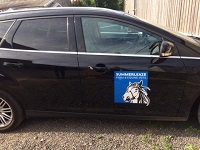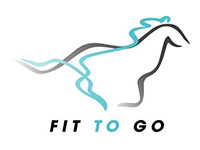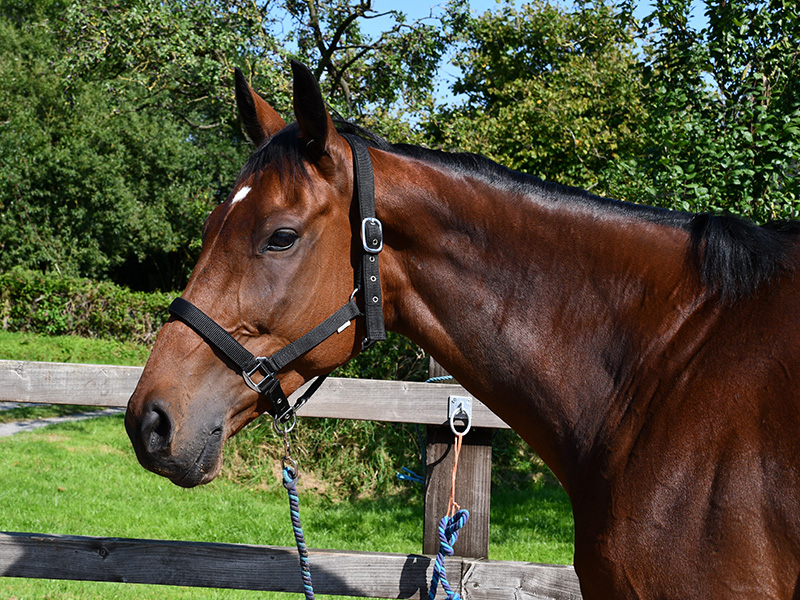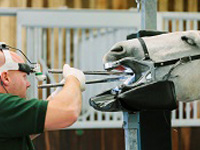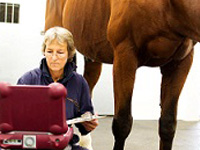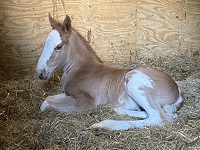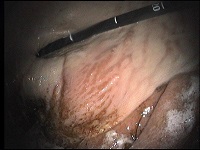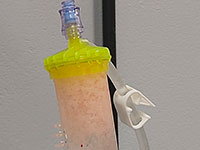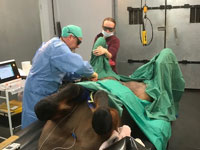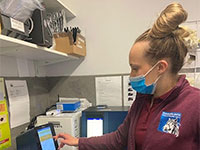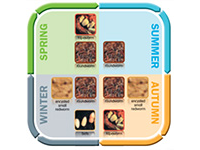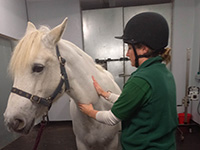Equine Euthanasia - What To Expect
It is never an easy decision to have any pet put to sleep, but we feel, as owners, it is our last duty to them to relieve suffering and make the end as dignified as possible.
Why, when and how this is done is very personal and although this sheet will give an overview and hopefully answer many questions you might have, we are always very happy to discuss your own specific needs.
- What do I need to think about:
- When and how would you like the euthanasia carried out?
- What would you like to do afterwards?
- Would you like to be present?
- Would you like to get any of the paperwork completed before? It is possible for us to get consent forms and even payments completed before the day to reduce any stress at a difficult time. If you would like us to arrange collection for you, we do ask that this is paid for in advance.
How is euthanasia carried out in the horse?
Broadly speaking there are 2 methods; however, in an emergency, due to the legal restrictions in carrying firearms, euthanasia will always be by injection.
Traditionally horses were put down using a firearm, although this is much rarer these days. It is still available, however not all our vets are able to perform this and there are some safety considerations that need to be planned for. If this is something you would prefer, please contact the practice to discuss.
In most cases horses are put to sleep using an injectable drug which initially anaesthetises them before stopping the heart. Most owners prefer this as it is more peaceful, particularly if they choose to be present.
Every horse and situation is individual so the exact method may vary but most of the time we administer a sedation dose first, to ensure that your horse stays calm throughout. A catheter may be placed in the vein in the neck and the euthanasia drug is given by intravenous injection. This is given quite slowly and there is a slight pause before the effects are usually seen.
Horses’ reaction to this can vary, but after the sedation they are unaware of what is happening so although sometimes it can appear worrying to us; they know nothing about it.
After the injection the vet will take the horse from you and request you stand back. This is important to keep everyone safe. The vast majority of horses lean back and then slump to the side but rarely they can slip or even rear at this stage; the vet will guide their fall as much as possible but with a large horse this is not always possible.
When lying down there is usually a minute or 2 before they fully slip away. Usually, it is safe to sit with them while this happens but please be aware that leg movements etc can still happen so take safety advice from the vet.
When the heart has stopped, sometimes the body responds by appearing to take a few very deep breaths. This is normal but can be worrying if you are not expecting it.
Your vet will then monitor the horse listening for a heartbeat and may check reflexes of the horse. If needed your vet will administer further medication.
Whether you choose to let any other horses see them following euthanasia is a personal choice, but some people feel it reduces pining afterwards.
Should I be present when my horse is put to sleep?
It is completely up to you whether you wish to be there or not. Some owners feel they would rather not remember their horse that way and worry that them getting upset would distress their horse whilst others would rather be there in their last moments. If you choose not to be present at the euthanasia, please let us know when booking the appointment so that we can bring a nurse. We will need someone to be present when we first arrive. Horses can also be brought into the practice to be euthanized.
What options do I have with regards burying or cremating my horse?
We can arrange for your horse to be collected and cremated without any ashes returned, due to cost this is the most common arrangement. But the practice can arrange for your horse to be collected and individually cremated so that you can keep your horse’s ashes. There are now several companies out there who can make jewelry out of ashes enabling you to keep your horse with you.
As most horses are pets, burying your horse is also an option but it is important to have permission from the landowner and check with the local authority regarding specific laws.
Is it any different if I have a donkey?
If you have several donkeys and one needs to be euthanized, it is essential that the other donkeys are able to see their friend once it has passed. It is recommended to allow a donkey to stay with a body until they chose to wander off to enable them to understand what has happened. This is also the case for donkeys with a horse or pony companion who has been euthanized. Donkeys can become very distressed at the loss of a companion, so it is important to monitor the surviving donkeys for any signs of colic or inappetence. We do often recommend that horses also get to see their friends after, but it is not likely to be as physically important as it is for a donkey.
Do old horses die naturally or do we have to euthanise them?
Sometimes our elderly patients are found having passed away naturally, however it is a very small minority. Many of our elder patients have illnesses that mean that eventually their welfare and quality of life would come into question if left to die naturally. If you are worried your horse is struggling, please discuss it with the vets at the practice. It may not be their time yet and we may be able to help keep them comfortable for longer treating any underlying conditions or managing any pain, but the most important thing is that we support you making the best decision for you and your horse.
Is it better to euthanise several old horses together?
Every situation is different and certainly if an owner felt that the other older companion would struggle once their friend had been euthanised it is sometimes a kindness to do them together. However, others may not feel this is necessary, so we are very much guided by you as to how best to approach such situations for your horses.
Can I have it in my will for my horse to be euthanized if I pass away?
This is certainly possible, but it is important to let those close to you know you wish to have this arrangement. It is best to have such wishes legally documented including preferences if you have them.
Is there anything I need to do once my horse has been euthanized?
It is important to send your passport back to the relevant passport agency so it can be recorded that the horse has been euthanized.
Having to euthanise a friend is always an incredibly hard decision and is the best and worst thing about being a horse owner (and a vet). If you are wanting advice about this topic, feel free to contact us at the practice or the BHS Friends At The End at 02476 840517, [email protected].

